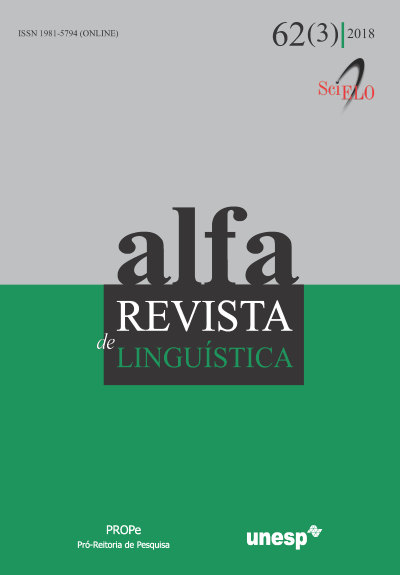Towards a comprehension of an intuition: criteria to distinguish verbal complementation from adjunction
DOI:
https://doi.org/10.1590/1981-5794-1811-6Keywords:
Verbs, Argument Structure, Adjunction, Syntactic Tests, Locative, Beneficiary,Abstract
The distinction between verbal arguments and adjuncts is essential to ground various linguistic theories. However, although we may have reliable intuitions regarding prototypical cases, such intuitions fail us in the judgment of certain verbal relations. We are, thus, in need of a reliable criterion (beyond mere intuition) that is capable of differentiating verb complementation from adjunction. Therefore, our goal here is to present and to discuss some of the main tests that purport to distinguish verb arguments from adjuncts (JACKENDOFF, 1977; DOWTY, 1982; CAPPELEN; LEPORE, 2005; HAEGEMAN, 2006; KENEDY, 2013; MIOTO; FIGUEIREDO SILVA; LOPES, 2013), especially concerning the thematic roles of beneficiary and locative – because they occur both in internal argument and in adjunct positions. We are going to present the following tests: (i) term optionality, (ii) subcategorization, (iii) s-selection, (iv) entailment and (v) anaphora, and try to indicate what problems each one of them faces. Surprisingly, the argument–adjunct distinction does not seem to find any consistent and definitive support in any of the tests found in the literature. The last one, however, anaphora, is the only one that seems capable of capturing this distinction, although it diagnoses as transitives some verbs usually considered to be unergative (like “to travel” (viajar) and “to phone” (telefonar)).
Downloads
Downloads
Published
How to Cite
Issue
Section
License
Manuscripts accepted for publication and published are property of Alfa: Revista de Linguística. It is forbidden the full or partial submission of the manuscript to any other journal. Authors are solely responsible for the article's content. Translation into another language without written permission from the Editor advised by the Editorial Board is prohibited.

